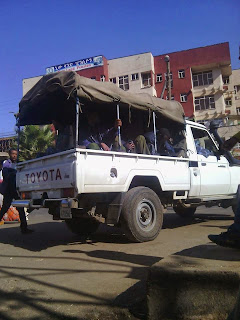ማን ይናገር የነበረ፣ ማን ያርዳ የቀበረ እንደሚባልው ስለ በረራ #et702 ትንሽ ዜና አለ
By: Bradley Wint -
It’s not everyday we see planes getting hijacked, and with the advent of social media, the story of hijacked Ethiopian flight 702 had spread across the world long before main stream media picked up on it.
The story had initially blown up on Twitter, Facebook, as well as on two aviation blogs, AirlineReporter.com and NYCAviation (live tweet session). The hashtag #ET702 also started trending worldwide, which is where I got most of my information from, along with live ATC audio streams from LiveATC.net. By the time Ethiopian 702 was on the ground, only then did actual news agencies like BBC and Sky News, pick up on the situation.
From an outsider’s perspective, it sounded like a very minor takeover. From information posted by the media, we were given the impression that the co-pilot locked the cockpit’s door once the captain went on his bathroom break. The co-pilot then flew the plan to Geneva instead of Rome, its intended destination. The aircraft circled the area a number of times in the area and then landed once fuel was too low to remain airborne. Finally, the hijacker (a.k.a co-pilot) escaped through the cockpit’s windows down a rope emergency ladder and gave himself up to Swiss authorities. Sounds like a relatively simple scenario, right? Unfortunately it wasn’t so rosy for the passengers on board.
Redditor OK3n detailed his ordeal for those harrowing hours from start to finish. I also included his luggage tag photo as proof. Here’s his story:
======
I’m a male, 25 Years old, I was in transit at Addis Adaba for flight ET702.
The plane was hijacked one hour after take-off. This is how it went down.
After entering the plane, I went to my seat: economy class, window-side and next to the right wing. As it was around midnight, I quickly fell asleep during take-off. I was waken up an hour later due to the sound of all the oxygen mask going down. I immediatly thought « what the… » I looked at my neighbor, she seemed as confused at me: the plane was not behaving oddly so I thought it was a simple technical glitch or somebody pressed the wrong button. Everybody looked at each other, thinking what’s going on. Suddenly, a deep and angry voice talked through the cabin radio: “SIT DOWN, PUT YOUR MASKS ON, I’M CUTTING THE OXYGEN”, three times. At this point, I realized that the situation is serious: someone is in the pilot cabin and has hijacked the plane. Within a few seconds, the oxygen went down in the cabin: I felt very lightheaded and quickly decided to put on the oxygen mask like the rest of the passengers. Quickly after that, the plane suddenly started dropping down for about 8 seconds then went fast back up, then finally stablized. People were crying, yelling, praying. I was in complete panic. Cold. We were then waiting for an update, an information, what was going on. But it never came. We flew for 6 more hours, knowing only that a pirate was at command. Who was he, what was his intentions ? I started thinking, too far. For he was probably alone, he couldn’t possibly be planning to land at an airport, he would immediatly get caught. So I quickly took away the possibilty of landing safely. As I was looking throught the window, all I could see was dark. Dark up, dark down.
For the next 6 hours, I was imagining every possible outcome of this story : from suddenly crashing into the ocean, to hitting a building, to crashing into another plane, to landing and being killed as a martyr. At this point, I remember trying to send a SMS to my family and girlfriend « There is a problem with the plane. I love you, you are the best » on a 5% battery and stressing that another terrorist would see me and shoot me. There was no network, so I decided to shut down my phone and thought of restarting it just before we crashed, so the messages would eventually come through. I held hands the whole way with my seat neighboor, a very nice, simple older italian woman. Every single second of those 6 hours of uncertainty and soon-to-be death was a psychological torture. I broke down, let everything go, said goodbye, though of my family, of moments in the past, of who will inherit my stuff and much more.
The flight was supposed to land at Rome at 4:40am. At 5:30am we were still high, high in the sky. Down throught the window , I could see a coast and some light far away that somehow reassured me. Around 5:45, the plane started suddenly to do circle. Circles left, circle right. It seemed that this went on at least 20 times. I was thinking that maybe the pirate wants to deplete the fuel and stall the plane. We were still at the same altitude, we were not going towards land. After this terribly long sequence of turns, the plane started going down towards land at a normal speed. When we reached the clouds, the wings deployed completely like a normal landing, but it seemed to me like it wanted to cover more area to do more damage. I was thinking : that’s it, we’re crashing into something. Looking down to the window I see a light, two, three, I can’t see what’s ahead. It’s still dark. We’re going fast, we’re flying over many houses now. And suddenly, under us, the airport. Just thinking again about this moment makes me shiver. We are landing. WE, are LANDING. Is this true ? Is this a miracle ? We touched the ground, and the plane eventually stopped completely in a bit away from the plane entrance to the terminal. I remember crying, while most of the people (Italians) were applauding. At this point, for the first time in 6 hours, we got an update from the steward telling us about the copilot, that we are in Geneva and that soon the Swiss police will enter and evacuate the plane. Eventually, the Swiss tactical forces entered the plane, telling is to put our hands on the head and stay calm. It took about 2-3 minutes person person to evacuate. An hour later, I was finally out. We were checked and accompanied very kindly by the swiss. There were sandwitches, hot chocolate, free wifi and psychologues. A few hours later, I could get my luggage and went out through normal gates. My mother was there, we went for a walk along the Leman lake and she cooked some good meal. The psychological impact is not negligible, I’m still in a state of shock. I’m a lucky bastard, I hope none of you have to experience that.
Why was my mother in Geneva? My final destination was Geneva, I work there. I had a flight from Rome to Geneva just after this one. As I was coming back from holidays, she had long planned on taking her days off to visit her friends in my hometown (1 hour away, France) and by the same occasion, visit me. In the end, I am very thankful and lucky to have her outside of the airport when I came out.
======
As a huge aviation enthusiast myself, situations like this are definitely scary and given that the co-pilot was responsible, it really brings about a sense of fear knowing that the very crew members we trust to bring us from point A to B can also put our lives at risk. However it doesn’t deter me from flying again, but I hope never go to through what this guy did.
 “We
are very happy to finally be able to give daily service to our
customers to and from London. Due to the airport congestion at London
Heathrow, we were constrained to 6 weekly flights. Now our customers to
and from London can enjoy convenient and hassle free daily connections
with our state-of-the art B787 aircraft,” said Ethiopian’s CEO Tewolde
Gebremariam.
“We
are very happy to finally be able to give daily service to our
customers to and from London. Due to the airport congestion at London
Heathrow, we were constrained to 6 weekly flights. Now our customers to
and from London can enjoy convenient and hassle free daily connections
with our state-of-the art B787 aircraft,” said Ethiopian’s CEO Tewolde
Gebremariam. “We
are very happy to finally be able to give daily service to our
customers to and from London. Due to the airport congestion at London
Heathrow, we were constrained to 6 weekly flights. Now our customers to
and from London can enjoy convenient and hassle free daily connections
with our state-of-the art B787 aircraft,” said Ethiopian’s CEO Tewolde
Gebremariam.
“We
are very happy to finally be able to give daily service to our
customers to and from London. Due to the airport congestion at London
Heathrow, we were constrained to 6 weekly flights. Now our customers to
and from London can enjoy convenient and hassle free daily connections
with our state-of-the art B787 aircraft,” said Ethiopian’s CEO Tewolde
Gebremariam.


















